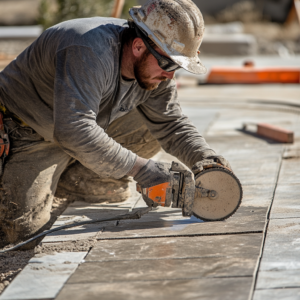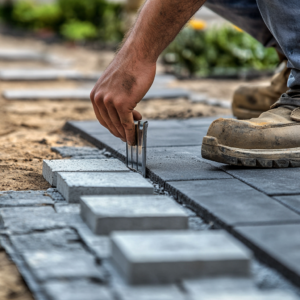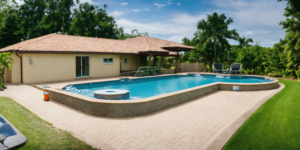Whenever a landscape project includes a pool, that pool will usually be the centerpiece of the entire project. And so, the battle between pavers vs travertine for pool deck is often what many homeowners see themselves into.
In this article, we are going to compare the options when it comes to poolside areas. We will divide pavers into two categories: brick pavers and concrete pavers. As for travertine, it is a natural stone.
With these three distinctions, we can start thinking about a comprehensive guide on the strengths and weaknesses of each one.
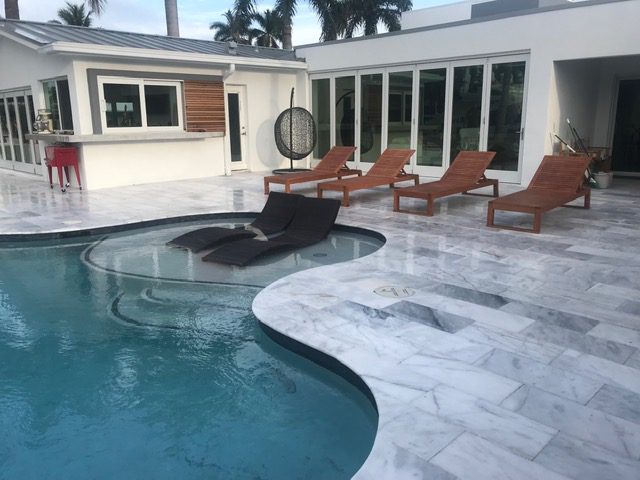
Jump to:
Pavers vs Travertine For Pool Deck
There are some elements that are common to any poolside installation, no matter what material you choose to go for.
First, your surface must be slip-resistant to avoid any accidents.
Second, the chemicals in the water can damage the material, being pavers or travertine, so the installation needs to be sealed. There’s no way around that.
And finally, drainage must be absolutely perfect in your installation, especially if you go for a sand base.
We highly recommend you hire professionals to help out with your poolside installation. They can clarify the battle between pavers vs travertine for pool deck and help you make a better decision, while also providing a perfect installation for your project.
Brick Pavers: Pros and Cons
One of the oldest building materials known to man, brick is a manufactured material made out of clay with many applications. One of those applications is to be used as flooring, in the form of pavers.
Brick is a very resistant material, relatively easy to maintain, and coming in a great variety of colors, shapes, and sizes. Out of all the manufactured paver options, it’s the one that remains more “natural” due to the simplicity of its fabrication process.
When applied to poolside areas, brick can easily blend into any environment and design. As long as you acquired bricks with texture – so they are slip-resistant – they become a good option for pool decks.
The biggest problem with bricks, however, occurs when laying them on the floor. If you choose to go for it, you want to make sure your brick paver installation is nothing short of perfect.
You see, with time, and under plenty of activity around the pool, the water can easily damage your installation if it is not perfectly arranged.
For starters, sealing is a must. And you want to make sure to use a sealer that will have a slip-resistant finish, of course. Sealing is also extremely important to prevent moss, mold, fungus, and efflorescence from getting into your paver joints.
Bricks can be installed both on sand, using a standard brick, and over a concrete base, using a thin version of it.
Concrete Pavers: Pros and Cons
Concrete pavers are a staple in the hardscape business. They add a tremendous amount of value to your home, all of it being affordable and easy to install.
Of all the three options, concrete pavers are for sure the most resistant one. When correctly installed and properly maintained, concrete pavers can last for decades, even on poolside areas.
They also have a wide array of options of designs and colors to choose from, even more than bricks. It is also possible to find pavers in standard thickness and thin thickness, for installation on sand or concrete, respectively.
Although concrete pavers are less prone to be individually damaged, their installation has the same problems as bricks. They need to be sealed and regularly cleaned to protect the project as a whole.
Travertine: Pros and Cons
Travertine is a close relative to marble and granite. It is a natural stone, considered to be a luxury item, which reflects on its price – being actually the most expensive of the options.
Just like bricks and concrete pavers, it can last for years under proper care and maintenance. However, they are slightly softer and can be cracked or chipped with heavy action.
Travertine is porous, which makes it naturally non-slippery. However, the chemicals that need to be used to keep the pool water clean can stain it, so it is not a good idea to use it without sealing.
Travertine, however, has some advantages that the other options don’t have. They are very resistant to freeze-thaw cycles, something that can happen a lot in installations in areas with extreme weather variance.
They also have a low rate of UV absorption, which means they are always cool to step on. Also, efflorescence doesn’t happen in travertine, something perfect for a poolside installation.
But for all its unique pros, there are also some unique cons.
The installation of travertine is even more difficult than brick or concrete pavers. It is a very heavy material that requires precision and strength to be handled.
Travertine also does not have a lot of options when it comes to colors and designs. Travertine pavers can hardly be found in any other form rather than square or rectangle – and even harder to be found in hues that shy away from more neutral tones.
Pavers vs Travertine: Comparison
| Brick Pavers | Concrete Pavers | Travertine Pavers | |
|---|---|---|---|
| Colors and Designs | Medium amount of options | Great amount of options | Very limited amount of options |
| Installation | Fairly difficult, requires sealing | Fairly difficult, requires sealing | Very difficult, requires sealing |
| Durability | Resistant to UV, prone to cracking | Very resistant material, but with high UV absorption | Very resistant to UV, prone to cracking and chipping |
| Price | $4 – $8 per square foot | $4 – $6 per square foot | $9 – $15 per square foot |
Professional Help With Pool Deck Installation
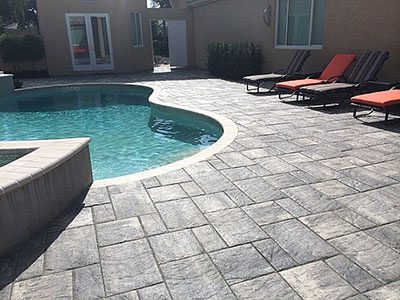
As we mentioned, poolside installations are not easy.
There are a lot of factors to consider, especially drainage of the area and precise workmanship techniques. It is not recommended to tackle a poolside installation from a DIY perspective.
We highly recommend you search your area for professionals in the hardscape business to help you with your pool project.
If you happen to be around Sarasota County, in FL, here at JS Brick we work with the best professionals the market has to offer!
Give us a call right now at +1 941 586 9140 to schedule a free consultation on your project. We’ll be waiting for you.
FAQ
Limestones, travertine being their best representative, are the best choices due to how well they handle water and weather effects.
No, it doesn’t. Travertine has the ability to disperse high temperatures and reflect sun rays. It constantly balances the hot temperatures from the sun with the cool temperatures from the ground below.
Yes, they do. But the choice of sealer when it comes to travertine is not a trivial one. You must choose a sealer that will maintain all the original benefits of travertine while protecting it from stains. This choice is best done by a professional.
Chlorine might cause some slight discoloration of travertine, but it doesn’t damage it. If the travertine is sealed, it will be protected against discoloration effects.
Yes, you can, but you need to be careful. You must start with the lowest possible pressure setting and slowly work your way up, stopping as soon as you see the cleaning take place.
For more information about the use of pressure wash with travertine pavers, as well as other maintenance tips, check out this article.
Travertine pavers can have different sizes and finishes. Usually, the prices vary between $12 and $16 per square foot.
The answer to that question may shock you. When properly cared for, travertine has the potential to last 100+ years. That makes travertine one of the best natural stone choices. Going with travertine, you won’t have to worry about pavers for the rest of your life.

